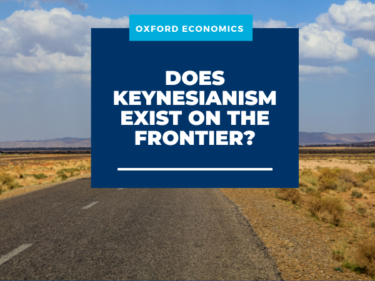Blog | 15 Feb 2021
Does Keynesianism exist on the frontier?

Jacques Nel
Head of Africa Macro

Economic policy discussions that take place at a global level are more often than not deliberations over the best way forward for advanced economies. The institutional and developmental realities in frontier markets mean that not only do policy objectives differ, but the policy tools available to authorities are in most cases much more limited.
While acknowledging the risk of overgeneralisation, monetary policy in most African countries is qualitatively different from that of advanced economies in both objective and scope. Whereas central banks in advanced economies have consistently missed inflation targets, as highlighted by my colleague Innes McFee in a recent blog post, frontier-market central banks have for the most part been preoccupied with containing inflation. This is difficult in an environment in which structural impediments to the transmission mechanism hinder a quick and complete pass-through of central bank signals to commercial interest rates. Consequently, many African central banks have used exchange rate policies to combat inflation. This has been to the detriment of external liquidity, as seen in countries such as Nigeria, Ethiopia and Angola.
On the flip side, monetary stimulus also takes another form in frontier markets (in those that have monetary sovereignty, that is). While policy rates have dropped to all-time lows in countries from South Africa to Morocco and Rwanda to Côte d’Ivoire during the Covid-19 pandemic, the more effective measures, arguably, have included widening the collateral accepted for central bank lending facilities and reducing liquidity and capital requirements for banks. Interest rate reductions merely reflect intentions.
Then there is the question of credibility. We have argued that this is an era for adventurist rather than conservative economic policy, and that risks to emerging market credibility from expansionary policies have rarely been lower. However, there is again a big difference between an emerging market context (with deep capital markets and a robust domestic financial sector) and frontier markets (without). If even the Bank of England’s credibility is being questioned, what recourse will the central banks of Kenya, Ghana or Mozambique have when the ground starts to shake?
On the fiscal side, there is an inherent contradiction when it comes to credibility in a Keynesian framework: using fiscal stimulus accompanied by a credible fiscal commitment towards deficit reduction. But future use of stimulus will be dependent on what fiscal authorities deem adequate employment or economic growth, meaning consolidation always takes a back seat. This question around credibility is complicated further in the African context, with government efforts to provide basic services already weighing on fiscal finances and pushing public debt higher and higher.
In recognising the central role that fiscal policy will play in the post-Covid recovery, we constructed a Fiscal Space Index to identify where fiscal stimulus could provide significant (and sustainable) support to the economic recovery. As expected, most African governments have almost no room for stimulus when taking into account the nature of spending (recurrent vs capital), steadily deteriorating debt metrics, and the economic devastations wrought by the coronavirus pandemic. In fact, some governments (notably the oil producers) will need to cut spending, thus exacerbating the economic fallout. Many African governments are already in debt distress.
Demand management in the Keynesian context seems somewhat abstract when basic needs remain unsatisfied.
Tags:
You may be interested in

Post
MENA – Latest Trends
Our blog will allow you to keep abreast of all the latest regional developments and trends as we share with you a selection of our latest economic analysis and forecasts. To provide you with the most insightful and incisive reports we combine our global expertise in forecasting and analysis with the local knowledge of our team of economists.
Find Out More
Post
Trumponomics – the economics of a second Trump presidency | Beyond the Headlines
The 2024 US Presidential Election is less than seven months away. In this week’s Beyond the Headlines, Bernard Yaros, Lead Economist, outlines two scenarios for the US economy if former President Donald Trump returns to the White House and Republicans sweep Congress.
Find Out More
Post
Global Trade Education: The role of private philanthropy
Global trade can amplify economic development and poverty alleviation. Capable leaders are required to put in place enabling conditions for trade, but currently these skills are underprovided in developing countries. For philanthropists, investing in trade leadership talent through graduate-level scholarships is an opportunity to make meaningful contributions that can multiply and sustain global economic development.
Find Out More